Concerned about a Loved One with a Mental Health Disorder?

Hello, My coaching practice is currently full, but the information in this article can still be helpful. I’m holding a group coaching call for parents soon and will post the information on this blog as soon as a date is confirmed. Julie
Do you love someone with bipolar disorder? This newsletter talks a bit more about my coaching pracice for family members and partners of people with bipolar disroder and other undisgnosed mental health disorders.
Julie, who do you coach in your family and partner coaching? Do you ever work with people who have bipolar disorder?
I hear these questions a lot. First of all, I do not coach people with bipolar disorder. I recommend my books for those with bipolar disorder and encourage people to get a strong health care team. I LOVE writing books for, speaking with and talking to people who have bipolar disorder, but in order to keep the situation stable, it’s a good policy for me to only work with those on the outside looking in.
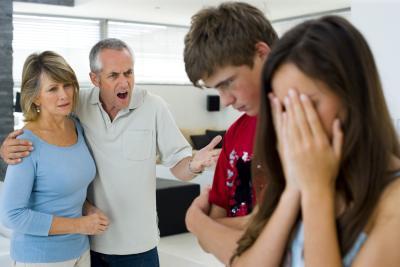 My family and partner coaching has changed a lot over the years. I have a system I use with all clients where they learn how to recognize symptoms very quickly and then change how they interact with the person who is ill. We have very, very quick results once my system is in place. I do a lot of crisis work where the loved one is not doing well and is often in danger and/or harming others. I like court cases, working with judges and DAs, custody cases, guardianship hearings and helping a family get a child into the appropriate treatment. The more chaotic the situation is when we start, the more I enjoy unraveling what I call the tangled ball of string.
My family and partner coaching has changed a lot over the years. I have a system I use with all clients where they learn how to recognize symptoms very quickly and then change how they interact with the person who is ill. We have very, very quick results once my system is in place. I do a lot of crisis work where the loved one is not doing well and is often in danger and/or harming others. I like court cases, working with judges and DAs, custody cases, guardianship hearings and helping a family get a child into the appropriate treatment. The more chaotic the situation is when we start, the more I enjoy unraveling what I call the tangled ball of string. My work is about my clients and their path regarding the illness of a loved one. I believe that parents and partners can only help once they are clear on a diagnosis, what medical treatment works and is needed and ultimately how to help the person manage an illness on a daily basis. I use my books with all of my clients and we learn how I manage the illness. They can then pass this on to a loved one. It works. All of my clients receive copies of my books and we use The Health Cards to create a family plan that works.
I recommend Take Charge of Bipolar Disorder for family members and Loving Someone with Bipolar Disorder for partners to start. Most people read both.
 I’ve done this for a long time now and have noticed where people need the most help:
I’ve done this for a long time now and have noticed where people need the most help: 1. The person with the illness doesn’t have a correct diagnosis. Using my charts and a system I learned from my coauthor Dr. John Preston, I help my clients get a complete picture of what is happening. This leads to a diagnosis suggestion they then take to a health care professional. It’s 99% accurate. I especially like to help in this area with children. I do a lot of work with anger, psychotic and personality disorders along with mood disorders.
2. People with more than one diagnosis. I do a lot of work pulling apart symptoms so that we can really assess what is happening. I find that psychosis is the symptom that hides the most- once it is figured out, lives can change dramatically. I also work with clients where the child has excessive and out of control anger, often from a young age.
3. Pot use. Over 50% of my client situations now involve pot. I help families and partners educate a loved one about pot and how it might affect the mood- we then come up with a plan to modify the pot smoking and if possible, get the person off completely if it’s obvious the pot is the problem. I do this a LOT.
4. Boundaries. This is my biggest success areas. Relationships get into very unstable patterns when a person in the relationship has an untreated mental health disorder. When my clients take back their lives and have strong and safe boundaries, this is where I see the most change. Yelling, fighting, throwing things, suicidal threats, aggressiveness, stealing, lying, manipulation and lack of empathy behaviors can all get better with the right use of boundaries by a family member or partner.
I’m not a therapist. I’m not a doctor. I do train therapists and doctors in my methods and my books are used around the world. My coaching is unique. If you are a family member or partner who would like to learn more, please visit my coaching page. I am getting over my own social anxiety issues and marketing myself more often so that I can help more people. We can all grow and change! I try to be an example of what I teach.
Julie
Please visit my family and partner coaching page to sign up for a complimentary intake session where I can answer your family member and partner questions.
Happiness is possible.

www.BipolarHappens.com
Please visit my BipolarHappens Blog for the latest posts on how I manage bipolar disorder.
My website www.JulieFast.com has the latest information on my speaking and coaching events as well as any recent media work.
Find me on Twitter @JulieBipolar
Find me on Facebook at Julie A. Fast and Julie A. Fast Books
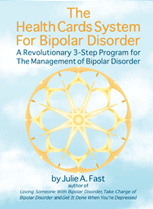
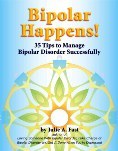
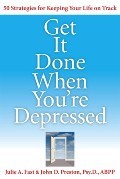
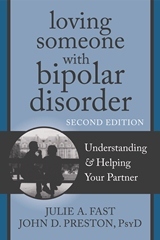
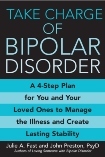
Related posts:
Guest Blogger Tara Rolstad: Parenting Children with Mental Health Disorders. It Gets Better!
Information on Julie’s books and coaching for parents and family members
Accepting New Family and Partner Coaching Clients
Published on September 13, 2015 10:09
No comments have been added yet.
Julie A. Fast's Blog
- Julie A. Fast's profile
- 67 followers
Julie A. Fast isn't a Goodreads Author
(yet),
but they
do have a blog,
so here are some recent posts imported from
their feed.



